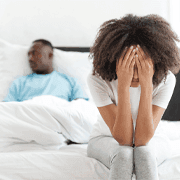Haemorrhoids: Busting Myths & Finding Facts
In This Article
Haemorrhoids: Busting Myths & Finding Facts
Krish
Updated on May 21, 2024
Medically verified by Dr. Arya
Fact checked by Dr. Pournami

Wellness
7 min read
The question of whether spicy food leads to haemorrhoids is a topic of significant interest, sparking debate among those affected by conditions like piles and irritable bowel syndrome.
While hemorrhoid symptoms are common, misconceptions about their causes abound, particularly the role diet plays in their development. Are you someone confused about what is myth and what is fact, when it comes to haemorrhoids?
Through this blog, Mykare Health will address the myths and facts surrounding the impact of haemorrhoids, utilising insights from medical research.
In the following sections, we will explore the nature of haemorrhoids, dispel commonly held beliefs, discuss effective management and treatment strategies, and offer advice on preventive measures and when to seek professional medical guidance.
Our aim is to provide clarity and guide those seeking to understand the relationship between their diet and hemorrhoid health.
What Are Haemorrhoids? Understanding the Basics
-
Haemorrhoids, commonly referred to as piles, are swollen veins located in the lower rectum or around the anus. These can be classified into two main types: internal and external.
-
Internal haemorrhoids, found within the rectum, typically do not cause pain but may lead to bleeding.
-
On the other hand, external haemorrhoids are situated under the skin around the anus and can result in symptoms such as pain, itching, and bleeding.
-
Approximately 1 in 20 Americans are affected by haemorrhoids, which tend to become more common with advancing age.
-
Several factors contribute to the development of haemorrhoids, including straining during bowel movements, prolonged sitting on the toilet, chronic constipation or diarrhoea, a low-fibre diet, being over the age of 50, pregnancy, and frequent heavy lifting.
-
The symptoms of haemorrhoids vary depending on the type and location but may include painless bleeding, prolapsed or protruding haemorrhoids, itching, irritation, swelling, and discomfort.
-
Although complications are rare, they can include severe conditions such as anaemia, strangulated haemorrhoids, and blood clots.
-
The underlying cause of haemorrhoids is increased pressure in the veins around the rectum and anus, often due to constipation, straining during bowel movements, or prolonged sitting.
-
This condition is characterised by the abnormal dilation and distortion of the vascular channels, along with destructive changes in the supporting connective tissue within the anal cushions.
-
Haemorrhoids are defined as the symptomatic enlargement and distal displacement of the normal anal cushions, with rectal bleeding during bowel movements being a common symptom.
 7 min read
7 min readPhysical Fitness and Sexual Health: How Exercise Boosts Your Sexual Life
 7 min read
7 min readSexually Transmitted Diseases: Types, Symptoms, Treatment
 14 min read
14 min readHow to Avoid Pregnancy After Sex
Get a Callback Now
Debunking Common Myths Surrounding Haemorrhoids
Myth 1: Spicy Foods Cause Hemorrhoids
Contrary to popular belief, spicy foods do not directly cause haemorrhoids. However, they can indirectly influence hemorrhoid discomfort by increasing abdominal pain and causing a burning sensation during bowel movements.
For those with pre-existing conditions, spicy foods might exacerbate inflammation, leading to increased soreness and even bleeding.
Myth 2: Dietary Impacts
Certain foods, including not only spicy dishes but also dairy products, processed foods like chips and salty snacks, and beverages such as alcohol and caffeine, can aggravate hemorrhoid symptoms.
It’s important to monitor dietary choices when managing this condition.
Myth 3: Physical Causes and Misconceptions
Many believe that sitting on cold surfaces can lead to haemorrhoids, which is a complete myth. Haemorrhoids are not caused by temperature but by increased pressure in the veins of the rectum and anus.
Similarly, they are not contagious and cannot be transmitted via toilet seats.
Myth 4: Haemorrhoids Are Permanent
There is a common misconception that once you develop haemorrhoids, they are a permanent part of your life.
This is not true; lifestyle changes such as incorporating a healthier diet, engaging in regular exercise, and avoiding prolonged sitting can significantly improve the condition.
Myth 5: Relationship with Serious Health Issues
Haemorrhoids themselves do not increase the risk of colorectal cancer. However, any rectal bleeding should be evaluated by a healthcare professional to rule out more serious conditions.
Using a cold compress can help relieve symptoms but does not address the underlying causes.
Myth 6: Effects of Spicy Foods on Anal Fissures
In addition to affecting haemorrhoids, spicy foods may worsen symptoms for individuals with existing anal fissures. A study highlighted that patients consuming chilies experienced a significant increase in burning sensations compared to those who took a placebo.
Most participants preferred the placebo, indicating the discomfort associated with spicy foods in such conditions.
Effective Management and Treatment Options
Medical and Non-Surgical Treatments
1. Conservative Treatments
In many cases, haemorrhoids are managed with non-surgical methods such as increasing fibre intake, using over-the-counter creams, and taking warm baths. Medications may include pain relievers and topical treatments to alleviate symptoms.
2. Advanced Non-Surgical Procedures
Several non-surgical techniques are available for more severe cases:
-
Rubber Band Ligation: This involves placing a rubber band around the base of the hemorrhoid to cut off its blood supply, causing it to wither and fall off.
-
Sclerotherapy: A chemical solution is injected into the hemorrhoidal tissue to shrink it.
-
Infrared Coagulation: This method uses infrared light to cause scar tissue, which cuts off the blood supply to the hemorrhoid.
Surgical Interventions
Hemorrhoidectomy: This is the surgical removal of excess tissue that causes bleeding. Various techniques are employed depending on the situation and severity.
- Stapled Hemorrhoidopexy: Used primarily for internal hemorrhoids, this procedure involves using a stapling device to block blood flow to hemorrhoidal tissue.
Preventive Measures Against Haemorrhoids
-
High-Fiber Diet: Incorporating high-fibre foods such as whole grains, nuts, vegetables, and fruits into your diet can soften stools and increase bulk, helping to prevent the need for straining during bowel movements.
-
Hydration: Drinking 6 to 8 glasses of water and other liquids daily is crucial to keeping stools soft and managing haemorrhoids effectively.
-
Fibre Supplements: For those who find it challenging to get enough fibre through diet alone, nonprescription fibre supplements like psyllium or methylcellulose may be beneficial in reducing symptoms and bleeding from haemorrhoids.
-
Regular Exercise: Engaging in regular physical activity helps prevent constipation and reduces pressure on veins, which can alleviate haemorrhoids. Exercise also aids in maintaining a healthy weight, further reducing the risk.
-
Avoid Prolonged Sitting: Limiting time spent sitting, especially on the toilet, can decrease the pressure on the veins in the anus and help prevent haemorrhoids.
-
Lifestyle Modifications: Incorporating a high-fibre diet, maintaining proper anal hygiene, and ensuring adequate fluid intake are vital steps in managing and preventing haemorrhoids. Regular exercise can help prevent constipation, one of the leading causes of haemorrhoids, by stimulating bowel function.
When to Seek Medical Advice
- Persistent Symptoms:
If haemorrhoids do not improve after a week of home care, or if symptoms are severe and persistent, consulting a healthcare professional is advised for personalised treatment.
- Rectal Bleeding:
Do not assume rectal bleeding is due to haemorrhoids as it can also indicate more serious conditions like colorectal cancer or anal cancer. Any changes in bowel habits, stool colour, or consistency should be promptly discussed with a healthcare provider.
- Emergency Situations:
Seek immediate medical attention if experiencing large amounts of rectal bleeding, lightheadedness, dizziness, or faintness, as these could indicate a more serious underlying condition.
By adhering to these preventive measures and recognizing when to seek professional advice, individuals can manage hemorrhoid symptoms effectively and reduce the risk of complications.
While spicy foods don't directly cause haemorrhoids, they can exacerbate discomfort and inflammation in individuals with pre-existing conditions.
Monitoring dietary choices, including avoiding spicy dishes, dairy, processed foods, alcohol, and caffeine, can help manage hemorrhoid symptoms effectively.
Sitting on cold surfaces does not cause haemorrhoids; rather, increased pressure in the veins of the rectum and anus is the primary cause. Haemorrhoids are not contagious and cannot be transmitted via toilet seats.
Lifestyle changes such as maintaining a healthy diet, regular exercise, and avoiding prolonged sitting can significantly improve hemorrhoid symptoms.
While haemorrhoids themselves do not increase the risk of colorectal cancer, any rectal bleeding should be evaluated by a healthcare professional to rule out serious conditions.
Spicy foods may worsen symptoms for individuals with anal fissures, leading to increased discomfort and burning sensations.
Various non-surgical and surgical treatments are available for managing haemorrhoids, ranging from conservative methods like increasing fibre intake to advanced procedures such as rubber band ligation and hemorrhoidectomy.
Incorporating a high-fibre diet, staying hydrated, regular exercise, avoiding prolonged sitting, and seeking medical advice for persistent symptoms or rectal bleeding are essential preventive measures.
Source Links
niddk.nih.gov
doctorbutlers.com
medicalnews.com



